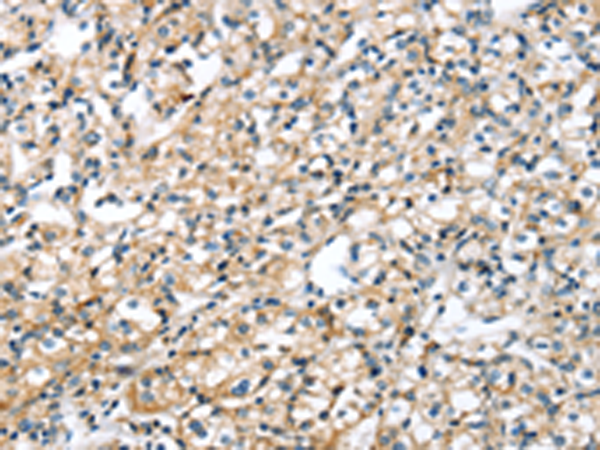

| WB | 咨询技术 | Human,Mouse,Rat |
| IF | 咨询技术 | Human,Mouse,Rat |
| IHC | 1/25-1/100 | Human,Mouse,Rat |
| ICC | 技术咨询 | Human,Mouse,Rat |
| FCM | 咨询技术 | Human,Mouse,Rat |
| Elisa | 1/1000-1/2000 | Human,Mouse,Rat |
| Aliases | HTX4; ACTRIIB; ActR-IIB |
| Host/Isotype | Rabbit IgG |
| Antibody Type | Primary antibody |
| Storage | Store at 4°C short term. Aliquot and store at -20°C long term. Avoid freeze/thaw cycles. |
| Species Reactivity | Human, Mouse, Rat |
| Immunogen | Fusion protein of human ACVR2B |
| Formulation | Purified antibody in PBS with 0.05% sodium azide and 50% glycerol. |
+ +
以下是关于ACVR2B抗体的3篇代表性文献,涵盖不同研究方向:
---
1. **文献名称**:*Targeting ACVR2B signaling to prevent cancer cachexia-induced muscle wasting*
**作者**:Zhou, X., et al.
**摘要**:本研究探讨了ACVR2B抗体通过阻断Activin A和myostatin信号通路,抑制肿瘤恶病质相关肌肉萎缩的机制。在小鼠模型中,抗体显著减少了肌肉消耗并延长生存期。
---
2. **文献名称**:*ACVR2B-Fc fusion protein increases muscle mass and improves functional outcomes in experimental sarcopenia*
**作者**:Smith, R.C., et al.
**摘要**:利用ACVR2B胞外结构域融合蛋白(抗体类似物),研究显示其能有效拮抗肌肉生长抑制素,增强老年小鼠肌肉质量和运动能力,为抗衰老治疗提供依据。
---
3. **文献名称**:*Monoclonal antibody blockade of ACVR2B enhances skeletal muscle regeneration*
**作者**:Lee, S.J., & Huynh, T.V.
**摘要**:开发了一种靶向ACVR2B的单克隆抗体,证明其通过激活Smad通路促进肌肉干细胞分化,加速损伤后肌肉再生,潜在应用于创伤或肌营养不良症。
---
这些研究分别从癌症恶病质、衰老性肌少症和肌肉再生角度,阐释了ACVR2B抗体的治疗潜力。如需具体DOI或发表年份,可进一步补充数据库检索。
The ACVR2B (Activin Receptor Type-2B) antibody targets a key transmembrane receptor in the TGF-β (transforming growth factor-beta) superfamily. ACVR2B binds ligands like activins, myostatin, and GDF-11. regulating cellular processes such as muscle growth, fat metabolism, and tissue homeostasis. Structurally, it contains an extracellular ligand-binding domain, a transmembrane region, and an intracellular kinase domain. Upon ligand binding, ACVR2B forms a complex with type I receptors (e.g., ALK4/5/7), activating Smad signaling pathways to modulate gene expression.
Research on ACVR2B antibodies focuses on their dual role as agonists or antagonists. Antagonistic antibodies block ligand-receptor interactions, potentially treating muscle-wasting diseases (e.g., muscular dystrophy, cancer cachexia) by inhibiting myostatin signaling to enhance muscle mass. Conversely, agonistic antibodies may mimic ligand effects, offering therapeutic avenues for metabolic disorders or bone diseases. ACVR2B is also implicated in cancer progression, with some tumors overexpressing the receptor, making it a biomarker or target for antibody-based therapies.
Preclinical studies highlight its therapeutic promise, though clinical translation remains ongoing. Challenges include optimizing specificity and minimizing off-target effects. Overall, ACVR2B antibodies represent a versatile tool for modulating TGF-β signaling, with broad implications for regenerative medicine, oncology, and metabolic disease treatment.
×